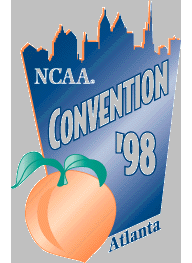The NCAA News - News and FeaturesJanuary 12, 1998
NCAA CONVENTION -- Division II legislation
Following is a summary of proposed legislation that will be considered January 12 by the Division II membership during the NCAA Convention in Atlanta:
Division II will consider 19 proposals -- including seven designated by the Division II Presidents Council for roll-call votes -- when it convenes its first legislative business session in the new governance structure.
 Four of the seven roll-call proposals -- all included in the Presidents Council grouping of proposals -- and a total of 11 proposals are sponsored by the Presidents Council, acting on recommendations from the Division II Management Council and the Association's committee structure. Four of the seven roll-call proposals -- all included in the Presidents Council grouping of proposals -- and a total of 11 proposals are sponsored by the Presidents Council, acting on recommendations from the Division II Management Council and the Association's committee structure.
The remaining eight proposals are sponsored by Division II conferences and institutions.
The Presidents Council's grouping of roll-call proposals includes measures that are regarded as being of particular interest to Division II chief executive officers. The grouping includes these proposals sponsored by the Presidents Council:
A proposal to require every Division II conference to form a conference student-athlete advisory committee as a condition of Division II membership. The purpose of the proposal is to promote the involvement of student-athletes in the administration of intercollegiate athletics at the regional and national levels.
A proposal to include conference staff members in legislation that currently prohibits student-athletes and institutional athletics staff members from participating in gambling activities.
A proposal to reduce the number of equivalency scholarships for cross country and track at schools that sponsor only cross country. The proposal would limit such institutions to six cross country scholarships for women and five for men (a similar proposal sponsored by two Division II conferences and also included in the Presidents Council grouping would set the limit at five for each gender).
A proposal placing limits on contact practices in spring football. The proposal resulted from discussions involving the NCAA Committee on Competitive Safeguards and Medical Aspects of Sports and the American Football Coaches Association.
The Presidents Council also has scheduled roll-call votes on membership proposals that would:
Exclude a Pell Grant from counting as part of a grant-in-aid, as was done in Division I at the 1996 Convention.
Decrease the permissible number of football scholarships in Division II from the equivalent of 36 financial aid awards to 30.
Other topics
Votes also are scheduled in Division II on proposals dealing with amateurism, eligibility, and playing-and-practice-seasons legislation.
The one proposal involving amateurism legislation would permit national governing bodies in Olympic sports to provide educational expenses to qualified current and prospective student-athletes. The Presidents Council is sponsoring the proposal on the recommendation of the NCAA Olympic Sports Liaison Committee.
Three of four proposals dealing with eligibility matters also are sponsored by the Presidents Council. The three proposals would:
Specify additional instances in which a violation of NCAA legislation would be classified as de minimus and would not render a prospective or enrolled student-athlete ineligible.
Specify circumstances in which institutions will not be required to declare a student-athlete who receives an improper benefit ineligible, provided the student-athlete repays the value of the benefit.
Permit a student-athlete who enrolls in a joint college/
high-school program to participate in extracurricular activities (other than intercollegiate athletics) without starting the student's "eligibility clock."
Division II institutions also are sponsoring a proposal dealing with eligibility legislation.
The proposal would permit a student-athlete who has transferred to a second four-year institution but did not receive athletically related financial aid or participate in intercollegiate athletics to transfer to a third four-year institution and use the one-time transfer exception.
The playing-and-practice seasons proposals include one Presidents Council proposal and two measures sponsored by the membership.
The Presidents Council is sponsoring a proposal to permit student-athletes in the sport of diving to practice beyond the end of the swimming practice season, provided those students engage in no more than a 144-day playing season.
In addition, two Division II conferences are sponsoring companion proposals that would permit institutions to exempt annually up to two basketball contests against either foreign teams or "club" members of USA Basketball from limits on the permissible number of contests.
'General' grouping
Division II members also will consider four measures grouped under the heading of "general" proposals.
Two are sponsored by the Presidents Council. They would:
Establish a Divisions I and II core-course review committee. Adoption is contingent on approval of the proposal in the Division I governance structure, where the Division I Board of Presidents recently tabled the measure for further study.
Add two members of the Men's and Women's Tennis Committee to ensure that all Division II regions are guaranteed representation on the committee.
The grouping of legislation is rounded out by two membership proposals. They would:
Permit institutions to conduct tryouts of currently enrolled students prior to the beginning of the playing and practice season.
Give conferences authority to impose disciplinary or corrective actions in selected secondary infractions cases, as prescribed by the Division II Committee on Infractions. The sponsors are seeking a more expeditious review of such cases and greater uniformity in penalties imposed.
Proposals adopted by the membership will become effective in August 1998 unless scheduled otherwise; an immediate effective date must be approved by a two-thirds vote of the membership in order for a proposal to become effective upon adjournment of the Convention.
|